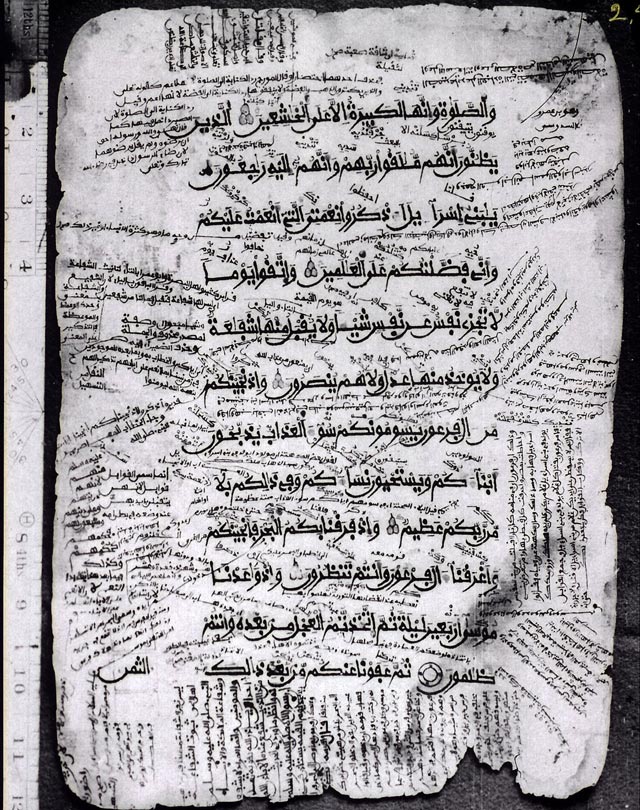
“Shettima Kagu Qur’an,” northeast Nigerian manuscript (approx 16th century). Source: University of London Early Nigerian Manuscripts Project.
This post is the third in a series on Muslim schooling in Northern Nigeria. The first post gave an overview of the series, and the second discussed Qur’anic schools.
by Alex Thurston
In Nigeria, advanced Islamic education–the step following one’s basic instruction in the Qur’an–takes various forms. Here, I’ll examine the traditional settings for advanced Islamic education. The term “traditional” is a problematic one, as “traditions” are sometimes much more recent – and more consciously invented – than outsiders might assume. But the term has some use for describing systems that have evolved over time and were not directly created by colonial or postcolonial governments or by postcolonial reformist movements. “Advanced Islamic education,” meanwhile, refers here to training beyond the memorization of the Qur’an and instruction in the basic ritual requirements of Islam.
This kind of training has occurred for centuries, and still occurs, in the homes and schools of individual teachers. Many Northern Muslims begin (as do their counterparts elsewhere in West Africa) by studying the Qur’an and basic religious instruction with their fathers or with other family members, but advanced training usually necessitates outside mentors. Religious seekers most often proceed from the Qur’an to introductory texts of Maliki fiqh (jurisprudence). The Maliki School, one of four main Sunni schools of legal thought, is the most widespread in North and West Africa. Introductory Maliki texts (some of which are available in Arabic and in translation here) treat similar issues, ranging from the requirements of prayer to the rules of inheritance. The curriculum proceeds not thematically, but in levels of complexity; each text deals with the same issues in greater depth, meaning that the student who advances to the level of mastering the Risala (Epistle) of Ibn Abi Zaid al Qayrawani or the Mukhtasar (Compendium) of Khalil ibn Ishaq has a deep grasp of fiqh. Sheikhs often teach by parsing Arabic texts line by line in local languages until students have mastered each lesson; even at this stage, memorization can play a large role in learning.
Once a student has a firm foundation in fiqh, he often proceeds to study with masters who have specialized competencies in areas like tafsir (exegesis of the Qur’an), hadith (reported words and deeds of the Prophet Muhammad, which have relevance for law in addition to other fields), Sufism, Arabic (including grammar), literature, astronomy (crucial for determining the direction of prayer or qibla), and other fields. Some students go even further in their study of fiqh. The traditional method of study can involve considerable travel; the nineteenth-century Fulani conqueror Sheikh Uthman dan Fodio went from present-day Northern Nigeria as far as Agadez, in the north of present-day Niger. Some traveling scholars, in the course of pilgrimage to Mecca, studied with masters in Cairo, Medina, and Mecca.
Traditional methods have attracted criticism in the twentieth and twenty-first centuries. Critics charge that students’ grasp of Arabic, especially spoken Arabic, is weak, or that the curriculum wastes time and discourages debate and critical thought. Yet traditional methods have proven highly durable as well as highly adaptable. One Sufi scholar I met in Kano ran a modernized “Islamiyya” school (these schools will be the topic of the next post), a massive complex with uniformed students, Western-style classrooms, and a science lab, but his family also continued to offer traditional-style lessons at their late father’s home in the old city. Traditional methods and curricula also provided the basis for colonial attempts at modernized Islamic education at Kano’s Shahuci Judicial School (founded 1928) and the School for Arabic Studies (founded 1934). In these manifestations, “traditional” and “modern” methods not only coexist, but are deeply in dialogue with one another.
It also seems that with the passage of time, more people have access to advanced Islamic education in the traditional mold. The growth of cities has increased the number of scholars together in major urban centers, potentially reducing the need for travel to far-flung destinations. The proliferation of mosques has created more spaces where scholars can teach. As a male researcher in a society that discourages close interactions between unmarried men and women, I had limited access to women’s perspectives, but my sense is that more female scholars exist now than in the past, and that they are offering lessons in their homes to large numbers of women. The dissemination of Islamic teachings and debates over Islamic issues on the radio also increases the educational opportunities available to women. This is not to say that there were not educated women in the past – Nana Asma’u, one of Sheikh Uthman dan Fodio’s daughters, earned a tremendous and enduring reputation for her scholarly achievements.
Advanced religious education is relevant for scholars, but also for any Muslim adult seeking deeper knowledge of scripture, law, and other fields. Many people pair a career in teaching and scholarship with another career; the archetype in Kano is the scholar-trader, of which one finds many to the present day, conducting trade by day and teaching their specialty to young students in the evenings.
Alex Thurston is a Ph.D. candidate in Religious Studies at Northwestern University. For 2011-2012, he is conducting dissertation fieldwork in Northern Nigeria. He blogs at http://sahelblog.wordpress.com. Read Alex’s previous posts on religion in Nigeria here.
With support from the Henry R. Luce Initiative on Religion and International Affairs.
